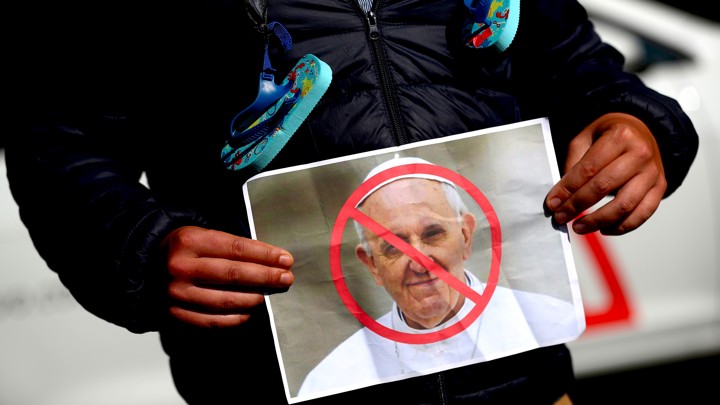The Sex-Abuse Scandal Is Growing Faster Than the Church Can Contain It
The Catholic world is struggling to absorb a week of new revelations and resignations.

A protester in Dublin holds a picture of Pope Francis during a demonstration against clerical sex abuse.HANNAH MCKAY / REUTERS.
Since Tuesday alone, a group of American Catholic leaders went to Rome to ask Francis some tough questions, while a women’s open letter demanding answers from him crossed the 45,000-signature mark. The pontiff summoned bishops from around the world to a future meeting, while making one bishop the subject of a new investigation. One cardinal who had come under fire for allegedly enabling accused priests to keep working for the Church announced his plans to resign, while another, who has been pressing for meaningful action against abusers, came under scrutiny himself. Amidst all this, a bombshell report about sex abuse in Germany was leaked to the press.
“Many strands are coming together,” said Kathleen Sprows Cummings, a historian of Catholicism at the University of Notre Dame. “It does seem like we are reaching a watershed moment.” By Thursday, there had been so many new developments that she said she was having a hard time keeping up—and that the leaders at the Vatican probably were, too. “I think they’re scrambling. The news is coming on so many fronts. I think they don’t know quite what to do.” Here is some of what they nevertheless did this week.
Church leaders from the U.S. met with the pope in Rome on Thursday. Cardinal Daniel DiNardo, the president of the U.S. Conference of Catholic Bishops, had called for a meeting to discuss allegations against Theodore McCarrick, a former cardinal who served as archbishop of Washington from 2001 to 2006. This summer, McCarrick resigned as cardinal after he was accused of sexual abuse. An explosive letter by the Vatican’s former ambassador to the U.S., Archbishop Carlo Maria Viganò, claimed last month that Francis had known for years about McCarrick’s alleged abuse yet allowed him to keep rising through the ranks of the Church. Francis has so far declined to comment publicly on Viganò’s accusations, and DiNardo and others were seeking an investigation into the matter.
“We shared with Pope Francis our situation in the United States—how the Body of Christ is lacerated by the evil of sexual abuse. He listened very deeply from the heart,” DiNardo said in a statement after leaving the meeting. “It was a lengthy, fruitful, and good exchange.” But if any concrete decisions came out of the papal meeting, DiNardo did not reveal them.
“I worry that the cardinals are coming home empty-handed. They were listened to, but it’s not clear they’re going to have support from the Vatican in terms of handling the investigation into the McCarrick situation,” Mary Rice Hasson, the director of the Catholic Women’s Forum, a network that aims to amplify the voices of Catholic women, told me Thursday. “The concern doesn’t go away because our cardinals had a nice listening session with Pope Francis. People want action.”
Catholics call for tangible reforms on Church sex abuse
Complicating matters further, on the eve of his meeting with the pope, DiNardo himself was accused of covering up abuse in his Galveston-Houston archdiocese, casting doubt on whether he could effectively lead the U.S. Church’s effort at reform, the Washington Post reported.
Even as DiNardo and other U.S. leaders gathered in Rome on Thursday, the pope accepted the immediate resignation of a West Virginia bishop, Michael J. Bransfield, over allegations that he had sexually harassed adults. Francis also authorized another bishop to investigate the allegations against Bransfield.
A plan for an unprecedented meeting of world bishops
Pope Francis on Wednesday summoned bishops from around the world to a first-of-its-kind meeting in Rome in February. The focus will be on protecting minors, and bishops will reportedly receive training in identifying abuse, intervening, and listening to victims.
The choice to summon the presidents of bishops’ conferences worldwide signals that the Vatican finally recognizes clergy sex abuse is a global problem, according to Cummings, the historian. “That’s a departure, an admission, that this is much bigger than any one culture or nation,” she said. In the past, she explained, Church leaders had suggested that the problem was limited to the U.S., but as scandals began to surface elsewhere—from Ireland to Australia to Chile to Germany—that story became impossible to believe.
Stephen Schneck, a former Catholic University professor, likewise told me, “I’ve come to the conclusion that the bishops can’t be trusted to police themselves. I think the ultimate solution, especially here in the U.S., is going to require an active, permanent role for the laity, because of the problem of oversight.”
A new bombshell report
A study has alleged that more than 3,600 children were sexually abused at the hands of some 1,670 clergy members over the past seven decades in Germany. Commissioned by Church officials and conducted by university researchers, the report was supposed to be released on September 25, but it was leaked to German outlets Spiegel Online and Die Zeit and reported this Wednesday instead. The findings implicate no less than 4.4 percent of the country’s clergy in abuse. A German bishop called the revelation “depressing and shameful.”
To the American Catholics I spoke to, it was something else, too: unsurprising. “A year ago, I would have been surprised,” Schneck said. “But now I think we have to recognize that this is a systemic problem within the clergy ranks around the world.” Cummings put it more bluntly: “I thought, ‘Of course. Here we go.’”
This study comes on the heels of another bombshell report. Just last month, a 900-page Pennsylvania grand-jury report detailed accusations against about 300 priests and alleged that their actions—which the report said involved more than 1,000 children—were covered up by diocese officials.
A cardinal on the verge of resignation
Cardinal Donald Wuerl, the archbishop of Washington, said Tuesday that he plans to travel to Rome soon, where he will ask the pope to accept his resignation. Wuerl has been heavily criticized after the Pennsylvania grand-jury report alleged that, as archbishop of Pittsburgh from 1988 to 2006, he had permitted priests accused of abusing minors to be reassigned or reinstated. He said Thursday that new leadership is needed to help the Washington archdiocese get past the “current confusion, disappointment, and disunity.”
The power play driving the latest Vatican crisis
Wuerl initially presented his resignation to Francis three years ago upon reaching the Church-mandated retirement age for bishops, 75, but the pontiff did not accept at the time. (This is fairly common; if the pope does not accept the pro forma resignation, the bishop continues to serve.) It’s unclear whether Francis will accept the resignation when Wuerl tenders it again.
“The fact that an archbishop has been chased into early retirement is very significant,” noted Schneck, who said he knows Wuerl personally. “He probably would’ve retired soon anyway, but nevertheless this was precipitated by the Pennsylvania grand-jury report. He has come to realize that he’s no longer effective as archbishop of Washington.”
In an ambiguous homily on Tuesday, Francis seemed to suggest that Satan was playing a role in the uncovering of the Church’s sex-abuse scandal. “In these times, it seems like the ‘Great Accuser’ [a biblical name for the devil] has been unchained and has it in for bishops. … He tries to uncover the sins, so they are visible in order to scandalize the people,” he said.
Some Catholics I spoke to speculated Francis may have been alluding to Viganò’s letter, which demanded the pope’s resignation. Either way, it struck some as a discordant remark at a moment when many are seeking contrition and humility from the Vatican.
“I thought it was the wrong note,” Schneck said. “This isn’t the time for that kind of language. … We need to recognize that the scandal itself was caused by the actions of the clergy, and the uncovering of this scandal is occurring as a result of the work of law enforcement around the world.”
The sex-abuse scandal has come for Pope Francis
The pope’s favorability has been plummeting in the U.S., among both Catholics and the general public. A year and a half ago, he enjoyed a 83 percent favorability rating among U.S. Catholics, but that’s dropped to 63 percent, according to CNN.
Cummings said she believes the pope is struggling personally. “How could he not be under strain? This is a crisis of a magnitude that we have not seen in a long time.”
Hasson, who drafted a public letter—now signed by 45,000 women—demanding answers from the pope about what he knew and when, said that although she and the other signatories love the Church, they are angry that the pope has not been more forthcoming and transparent. “The Church itself needs to get serious about spiritual integrity,” she said. “People are now praying for the Church.”
Source: https://www.theatlantic.com/international/archive/2018/09/catholic-sex-abuse-pope-francis/570208/
